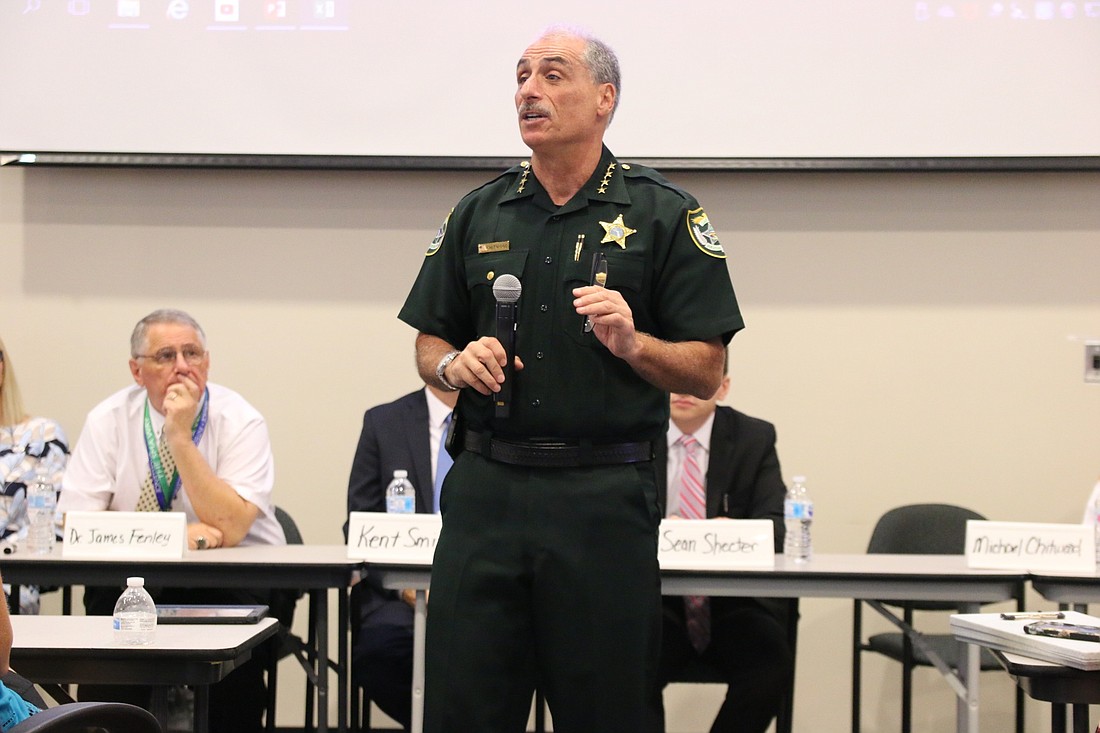- February 5, 2025
-
-
Loading

Loading

In the first six months of 2018, there have been 271 drug overdose deaths. Of those deaths, the majority, 31.37%, took place in Daytona Beach, while Deltona followed with 31 deaths. Ormond Beach had 23, Port Orange 20.
These were a portion of the numbers shared by Volusia County Sheriff Mike Chitwood, who was part of a panel discussing the local and national opioid crisis during a Wednesday, June 13, One Voice for Volusia Town Hall.
"It's not just a law enforcement issue, not just an education issue, not just a medical association issue ... it reaches every aspect of the community."
— Heather Post, Volusia County Council
According to Chitwood, when opioids were becoming more prevalent in the northeastern part of the U.S., Volusia was still dealing with other drugs, such as meth and cocaine. He said it wasn't until three years ago that the county went from having 30 to 35 overdoses a year to more than 100 overdoses a year.
"It is a crisis so much so that it's been named a national public health emergency," Councilwoman Heather Post said. "It's not just a law enforcement issue, not just an education issue, not just a medical association issue ... it reaches every aspect of the community."
Chitwood said that the majority of the overdoses that happened have taken place between Ridgewood Avenue and the ocean as well as between International Speedway Boulevard and Seabreeze. Of the 2018 statistics, 164 deaths were males and 104 were females. Last week in Ormond Beach, there were two back-to-back incidents where officers used Narcan, which is used in emergency narcotic overdose situations, according to Chitwood.
Additionally, Chitwood said that each overdose death is now being treated as a homicide, and the drug dealer is immediately sought out.
"It's getting worse," Daytona Beach Police Chief Craig Capri said. "In the last couple of months, we've had a lot of overdoses."
Capri and Chitwood both said that another problem with opioids is the number of people who are left trying to deal with a loved one dying from an overdose or individuals who now have to care for the children of a parent who overdosed.
FBI Special Agent Kent Smith said the opioid epidemic is unlike any that the agency has ever seen. He pointed out that while the war of opioids has been taken up by the federal government, the issue is also an educational, health professional and community issue.
"The work that we do can't be done alone," Smith said. "It is a huge problem."
Assistant U.S. Attorney Sean Shecter said a major goal is to make it harder for the drugs to get into the streets by targeting dealers. One example Shecter gave to show why there has been such a push to get opioids out of the community was a drug trafficking organization that had about 2.8 kilos of heroin stored in their central location. But on top of this, Shecter said it had been laced with enough fentanyl to kill multiple people.
For a full recovery, Fenley said more than medication is needed — there has to be comprehensive treatment along with support groups and help to know the difference between sober and addictive thinking.
Taking someone to the hospital is not enough, Chitwood said.
"They overdose, we take them the hospital, then they walk out," Chitwood said. "There's no safety net there ... we need action."
According to Post, the Public Safety Coordinating Council is formulating an assessment of the availability for pre-trial intervention and probation programs, work release programs and substance abuse programs for individuals with opioid addictions. Post said the Florida Association of Counties is also having their annual conference, which will be focused on addressing opioid deaths, drug misuse and treatment.
However, Post said that this is a battle that can only be won through a collaborative effort between officials and by seeking out suggestions and information from the community.
"Those adverse effects have very, very long-term lasting effects to our families, to our community," Post said, adding, "without collaboration, without input, we can't do the best that we can in our roles."